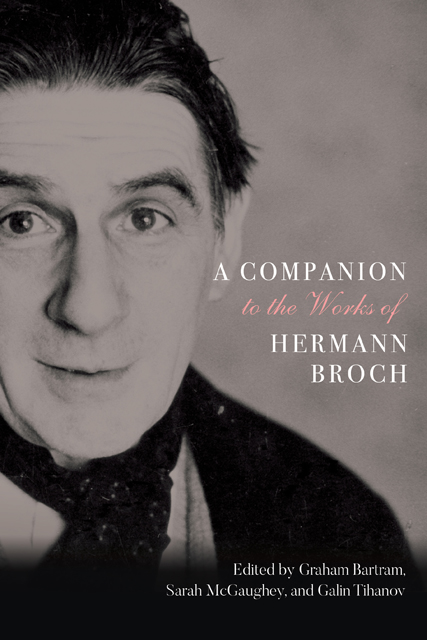Book contents
- Frontmatter
- Contents
- Preface
- Acknowledgments
- List of Abbreviations
- Introduction: Broch’s Life and Works
- 1 Perspectives on Broch’s Die Schlafwandler: Narratives of History and the Self
- 2 Hermann Broch and the Dilemma of Literature in the Modern Age
- 3 Interrogating Modernity: Hermann Broch’s Postromanticism
- 4 Broch and the Theater: Die Entsühnung and Aus der Luft gegriffen as Tragic and Comic Dramatizations of the Economic Machine
- 5 Limits of the Scientific: Broch’s Die Unbekannte Größe
- 6 Broch’s Die Verzauberung: Ludwig Klages and the Bourgeois Mitläufer
- 7 Hermann Broch’s Massenwahnprojekt and Its Relevance for Our Times
- 8 Human Rights and the Intellectual’s Ethical Duty: Broch’s Political Writings
- 9 Broch’s Der Tod des Vergil: Art and Power, Language and the Ineffable
- 10 From the “Tierkreis-Erzählungen” to Die Schuldlosen: The Creation of Broch’s Last Novel
- 11 Broch’s Legacy and Resonance
- Selected Bibliography
- Notes on the Contributors
- Index
5 - Limits of the Scientific: Broch’s Die Unbekannte Größe
Published online by Cambridge University Press: 20 January 2023
- Frontmatter
- Contents
- Preface
- Acknowledgments
- List of Abbreviations
- Introduction: Broch’s Life and Works
- 1 Perspectives on Broch’s Die Schlafwandler: Narratives of History and the Self
- 2 Hermann Broch and the Dilemma of Literature in the Modern Age
- 3 Interrogating Modernity: Hermann Broch’s Postromanticism
- 4 Broch and the Theater: Die Entsühnung and Aus der Luft gegriffen as Tragic and Comic Dramatizations of the Economic Machine
- 5 Limits of the Scientific: Broch’s Die Unbekannte Größe
- 6 Broch’s Die Verzauberung: Ludwig Klages and the Bourgeois Mitläufer
- 7 Hermann Broch’s Massenwahnprojekt and Its Relevance for Our Times
- 8 Human Rights and the Intellectual’s Ethical Duty: Broch’s Political Writings
- 9 Broch’s Der Tod des Vergil: Art and Power, Language and the Ineffable
- 10 From the “Tierkreis-Erzählungen” to Die Schuldlosen: The Creation of Broch’s Last Novel
- 11 Broch’s Legacy and Resonance
- Selected Bibliography
- Notes on the Contributors
- Index
Summary
Under great financial pressure and personal distress, Broch composed with extreme haste in the summer of 1933 a short novel that he would later famously reject as “ein mieses Buch, das verscharrt und vergessen bleiben soll!”(a rotten book that must stay buried and forgotten!). Although Die Unbekannte Größewas Broch’s greatest commercial success, the author repeatedly disparaged it in correspondence, and most scholars of Broch’s literature have followed his lead in dismissing it as aesthetically and formally weak.Since around 1999, however, interest in Broch’s second novel has grown significantly, because it provides insight into his relationship to mathematics and the natural sciences, especially modern physics, and further analysis has revealed it to be the most direct and transparent literary manifestation of Broch’s philosophy. A sparse but expanding body of secondary literature seeks to understand the role of Die Unbekannte Größe in Broch’s greater body of works.
In the novel the somewhat autobiographically conceived doctoral student Richard Hieck attempts to order his life by means of rational inquiry and strives toward comprehensive mathematical and scientific knowledge, with the express goal of one day achieving Erkenntnis (a central concept to Broch that cannot be translated to a single word in English and represents a complex mix of “knowledge,” “insight,” “perception,” “awareness,” and “cognition”).Richard believes that Erkenntnis is attainable through purely rational means and strives to understand all of life in mathematical terms. Through a series of events that occur outside the control of reason, however, he comes to realize that there are irrational elements in life that cannot be repressed and without acknowledgment of which true Erkenntnis cannot occur. Richard lives in a cramped apartment in a German-speaking university town with his mother; his sister Susanne, five years his junior; and his brother, Otto, another five years younger.There are two additional siblings, Rudolf and Emilie; they are between Richard and Susanne in age, and both have left town. The father died many years prior to the opening of the narrative.
- Type
- Chapter
- Information
- A Companion to the Works of Hermann Broch , pp. 108 - 122Publisher: Boydell & BrewerPrint publication year: 2019



